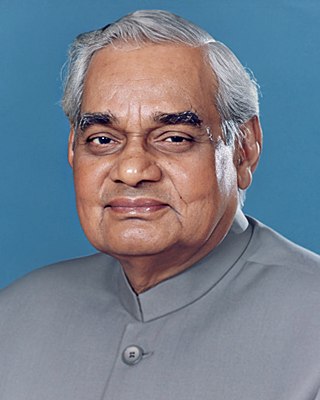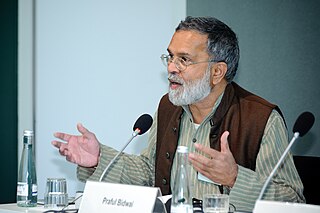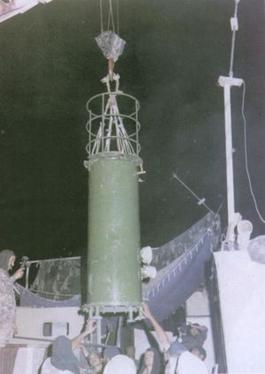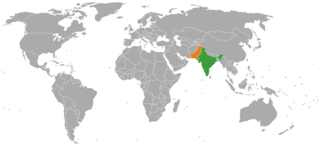Related Research Articles

Atal Bihari Vajpayee was an Indian politician who served three terms as the 10th Prime Minister of India, first for a term of 13 days in 1996, then for a period of 13 months from 1998 to 1999, followed by a full term from 1999 to 2004. Vajpayee was one of the co-founders and a senior leader of the BJP. He was a member of the RSS, a Hindu nationalist volunteer organisation. He was the first Indian prime minister not of the INC to serve a full term in office. He was also a renowned poet and a writer.

Mani Shankar Aiyar is an Indian politician and former career civil servant diplomat. He is a member of the Indian National Congress Party.

Praful Bidwai was an Indian journalist, political analyst, and activist. He was known for his left-leaning analysis of India's politics and economics. In Bidwai's memory, his friends, including The Transnational Institute, created the Praful Bidwai Memorial Award intended to honor and highlight courageous and independent voices in journalism.

The Pokhran-II tests were a series of five nuclear bomb test explosions conducted by India at the Indian Army's Pokhran Test Range in May 1998. It was the second instance of nuclear testing conducted by India; the first test, code-named Smiling Buddha, was conducted in May 1974.

Krishnaswamy Subrahmanyam was a prominent international strategic affairs analyst, journalist and former Indian civil servant. Considered a proponent of Realpolitik, Subrahmanyam was an influential voice in Indian security affairs for a long time. He was most often referred to as the doyen of India's strategic affairs community, and as the premier ideological champion of India's nuclear deterrent. His son S Jaishankar was appointed India's External Affairs Minister in 2019.

Fish head curry is a Singaporean dish deriving from a hybrid of Indian and Chinese ethnic cuisines. The head of a red snapper is stewed in a curry with assorted vegetables such as okra and eggplants. It is usually served with either rice or bread, or as a shared dish.

The Lahore Declaration was a bilateral agreement and governance treaty between India and Pakistan. The treaty was signed on 21 February 1999, at the conclusion of a historic summit in Lahore, and ratified by the parliaments of both countries the same year.

Chwee kueh, also spelt chwee kwee or chwee kweh, is a type of steamed rice cake originating in Teochew cuisine that is served with preserved radish.

Shivshankar Menon is an Indian diplomat, who served as National Security Adviser of India under Prime Minister of India Manmohan Singh. He had previously served as the Foreign Secretary in the Ministry of External Affairs. Prior to that he was Indian High Commissioner to Pakistan, and Sri Lanka and ambassador to China and Israel. He is currently Distinguished Fellow at the Centre for Social and Economic Progress. He is also Visiting Professor of International Relations at Ashoka University.

India–Japan relations have traditionally been strong. The people of India and Japan have engaged in cultural exchanges, primarily as a result of Buddhism, which spread from India to Japan in ancient times. The people of India and Japan are guided by common cultural traditions, including the shared heritage of Buddhism, and share a strong commitment to the ideals of democracy, tolerance, pluralism, and open societies.

United Nations Security Council resolution 1172, adopted unanimously on 6 June 1998, after hearing of nuclear tests conducted by India and Pakistan in May 1998, the Council condemned the tests and demanded that both countries refrain from engaging in further tests.

Huang Na was an eight-year-old Chinese national residing in Pasir Panjang, Singapore, who disappeared on 10 October 2004. Her mother, the police and the community conducted a three-week-long nationwide search for her. After her body was found, many Singaporeans attended her wake and funeral, giving bai jin and gifts. In a high-profile 14-day trial, Malaysian-born Took Leng How, a vegetable packer at the wholesale centre, was found guilty of murdering her and hanged after an appeal and a request for presidential clemency failed.
Vakkom Abdul Khader (1917–1943) was an Indian revolutionary and soldier in the Indian National Army, which fought for Indian freedom under Subhas Chandra Bose allied with Japan. Khader was a revolutionary and trained radio communicator. He was hanged in Madras Central Jail on 10 September 1943 with three comrades: Satyen Bardhan and Anandan and Fauja Singh. All three walked to their execution singing Vande Mataram. Abdul Khader also shouted "Netaji Subhas Babu ki jai! Down with the British Government! Victory to India!”

Dr. W. Lawrence S. Prabhakar, M.A, Ph.D. is an associate professor of Strategic Studies and International Relations in the department of Political Science at Madras Christian College, India and Adjunct Research Fellow, S.Rajaratnam School of International Studies, Nanyang Technological University, Singapore.

Subhas Anandan was a Singaporean criminal lawyer. He had appeared in numerous notable cases, including a case involving actress Quan Yi Fong hitting a taxi driver in 2010, and a case involving retail tycoon Tang Wee Sung in 2008 — who tried to illegally purchase a kidney from a living donor, as well as many murder cases, like those of Anthony Ler who manipulated and instigated a 15-year-old boy to kill his estranged wife in 2001; Took Leng How, who murdered Huang Na in 2004; robber and kidnapper Abdul Nasir bin Amer Hamsah; Tan Chor Jin, who shot a nightclub owner in Serangoon; and Leong Siew Chor, who killed and dismembered his lover.

The most significant initiative made by the Narendra Modi government is the focus on neighbouring countries and major Asian powers coupled with emphasizing on the two decades old Look East policy. Asia being the major focus area of his foreign policy, Modi and his foreign minister chose several Asian countries for their initial bilateral visits. He has made state visits to Bhutan and Nepal and Japan within the first 100 days of his government and also hosted Asian leaders like former Prime Minister Tony Abbott of Australia, President Xi Jinping of China and Prime Minister Nguyễn Tấn Dũng of Vietnam, apart from inviting SAARC leaders in his inauguration ceremony. External Affairs Minister Sushma Swaraj has also made official visits to several Asian capitals like Dhaka, Bangladesh, Kathmandu, Nepal, Naypidaw, Myanmar, Singapore, Hanoi, Vietnam, Manama, Bahrain, Kabul, Afghanistan, Dushanbe, Tajikistan, Malé, Maldives, Abu Dhabi, United Arab Emirates, Seoul, South Korea and Beijing China.

The Tan Kim Seng Fountain is a fountain in Singapore that was erected in 1882 in honor of notable philanthropist Tan Kim Seng for his donations for the Singapore's first reservoir and waterworks.
On 6 June 1994, two Japanese tourists were robbed and attacked by two men in their shared room in the Oriental Hotel in Singapore. One of them was brutally assaulted and died, while the other survived. The case, known as the Oriental Hotel murder, was classified as murder by the police. The perpetrators were eventually caught 2 years later and they were subsequently sentenced to serve lengthy jail terms with caning for their part in the robbery and assault of the two tourists, as well as for unrelated offences committed before their arrests.

The Kallang River body parts murder was a murder and dismemberment case that occurred in Singapore. The case earned its name due to the body parts of the victim, 22-year-old Liu Hong Mei, being found disposed in Kallang River. In this case, Liu's 50-year-old supervisor Leong Siew Chor used a towel to strangle her to death, and he also butchered her body into seven pieces - mainly her head, upper torso, lower torso, legs and feet - before disposing them in Kallang River and other locations in Singapore.
On 2 December 2001, a 19-year-old Indonesian maid, Muawanatul Chasanah, was found beaten to death in a house by the Bedok Reservoir, Singapore.
References
- ↑ "CRCAS Alumni and their Research Topics". www.jnu.ac.in. Archived from the original on 21 February 2017. Retrieved 18 December 2019.
- ↑ P.R. Chari (ed), Indo-US Nuclear Deal: A Case Study in Indo-US Relations , p. 315 (Routledge, New Delhi, 2009), available online
- ↑ "Shankar gets 16 months, 4 strokes and a mouthful". eresources.nlb.gov.sg. Retrieved 28 January 2020.
- ↑ Suryanarayana, P. s (31 December 2003). "Indian national convicted in Singapore". The Hindu. ISSN 0971-751X . Retrieved 28 January 2020.
- ↑ "Former TV presenter found guilty of sex charge | The Star Online". www.thestar.com.my. Retrieved 28 January 2020.
- ↑ "TV Aiyar faces cane and jail for molestation". www.telegraphindia.com. Retrieved 28 January 2020.
- ↑ Anandan, Subhas (15 June 2015). The Best I Could. Marshall Cavendish International Asia Pte Ltd. ISBN 978-981-4677-88-2.
- ↑ Anandan, Subhas (15 June 2015). The Best I Could. Marshall Cavendish International Asia Pte Ltd. ISBN 978-981-4677-88-2.
- ↑ "Time for India to invigorate disarmament plan: panel". The Hindu. 20 August 2011.
- ↑ "Time for India to invigorate disarmament plan: panel". nsspi.tamu.edu. Archived from the original on 11 June 2016. Retrieved 18 December 2019.